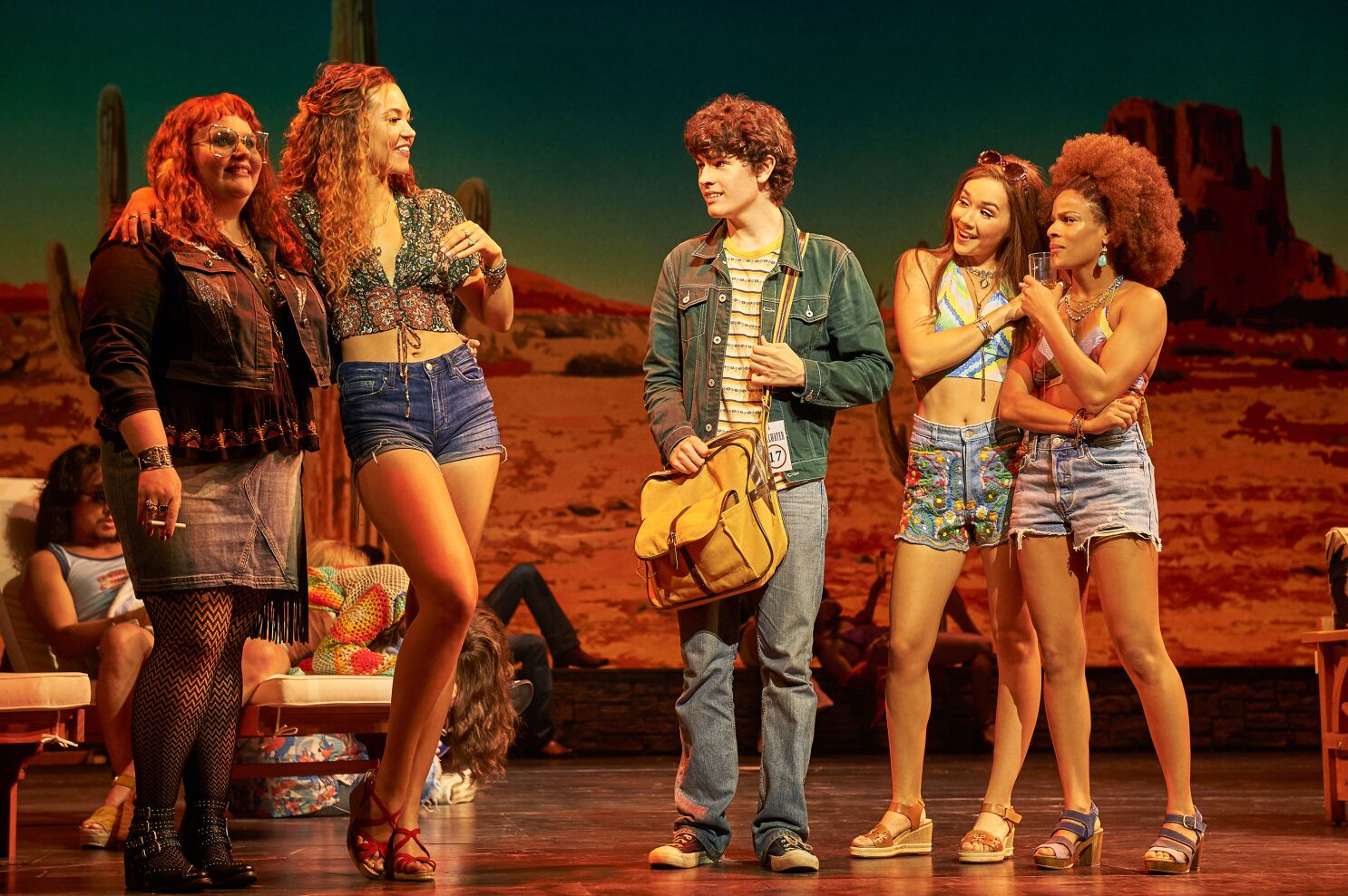Review: In ‘Almost Famous,’ the Heart of Rock ’n’ Roll Flatlines
Cameron Crowe’s 2000 film, set in the world of bands and groupies, does not survive its Broadway musical transplant.
At its best, rock ’n’ roll is “a form that is gloriously and righteously dumb” — or so decrees Lester Bangs, a character in the new musical “Almost Famous.”

Alas, the show, which opened on Broadway on Thursday, gets the wrong part of that formula right. Though celebrating the rock world of 1973, when the real Lester Bangs was the field’s most influential critic, “Almost Famous” is neither glorious nor righteous. It barely even has a form.
That leaves dumb, and I’m sorry to say that despite the intelligence of the 2000 movie on which it’s based, and the track record of its creators, the stage musical misses every opportunity to be the sharp, smart entertainment it might have been.
In retelling the story of a 15-year-old who gets sucked prematurely into the world of bands and groupies and roadies and drugs, it lands instead in a mystifying muddle, occasionally diverting but never affecting.
It Needn’t Have Been That Way; The Source Material Is Rich. But Perhaps Because The Story Is Semi-autobiographical, Cameron Crowe, Who Wrote And Directed The Movie, Apparently Saw Little Reason To Rethink It For The Stage.
The 15-year-old, William Miller (Casey Likes), still sets out, under the tutelage of Bangs (Rob Colletti), to be a rock journalist. When Rolling Stone, thinking he is much older, assigns him to cover a middling band called Stillwater — a composite of several groups Crowe actually toured with — William is torn between Bangs’s warning not to befriend his subjects and his own craving to be cool.

Recommended: Next Exit Review: A Thoughtful, Clever Road Trip Through Death and Regret
But musical theater is a radically different beast from the film, let alone life, and Crowe, working with the composer and co-lyricist, Tom Kitt, and the director Jeremy Herrin, does not seem to have accounted for that.
The screenplay limited itself to William’s point of view, revealing the other main characters — especially Stillwater’s frontman, Russell Hammond, and his muse, Penny Lane — through the boy’s adoring eyes. William himself was characterized almost entirely by the act of watching, which was sufficient and even necessary to Crowe’s purposes.
A Musical Can’t Work That Way. If He’s Going To Sing — And If He’s The Protagonist He Has To — William Must Have Something Worth Singing About.
But Crowe and Kitt have given him only one real solo, the excellent “No Friends,” which is engaging because it grapples with a real conflict the boy’s faces. One is not enough, and though Likes, making his Broadway debut at 20, is appealing in the role and delivers when given the chance, there’s a hole at the center of the story that no amount of stage business can disguise.
Not that Herrin doesn’t try. “Almost Famous” is one of the busiest book musicals I can recall, the stage so constantly and minutely activated (with choreography by Sarah O’Gleby) that it soon seems as flat and futile as an ant farm.
Big moments, like Hammond’s acid-fueled dive from the roof of a house into a swimming pool, barely register; the settings by Derek McLane are resolutely unspectacular. And even in ordinary moments, filled with overdrawn caricatures slamming into one another, it’s often difficult to locate the important information amid all the empty industry.
The same underwhelming overload hampers the music, which is obviously a bigger problem for a musical. Of the astounding 30 numbers listed in the program, only seven are what I’d call real theater songs.
They are useful in establishing William’s overprotective mother (tartly played by Anika Larsen) and, in “Morocco,” the show’s best tune, Solea Pfeiffer’s dreamy but slippery Penny. “The Night-Time Sky’s Got Nothing on You,” a duet for her and Russell (Chris Wood), sounds, as it should, like an actual love song of the era, but for once with lyrics that trace a theatrical arc.
Unfortunately, most of the rest of the songs are fragments, reprises or ensemble numbers so spliced with dialogue and served up in small bits as to nullify their expressive value. Some of them might be quite nice — Kitt’s melodies are never uninteresting — if they could just be sung through.
Recommended: Social Media Users Are Calling Rihanna Out For Including Johnny Depp In Her Coming Savage X Fenty Fashion Show
But The Show’s Biggest Musical Problem Comes From The Fact That An Unmanageably Large Proportion Of Its Songs, Perhaps A Third, Are Covered.
Originally made famous by the likes of the Allman Brothers Band, Deep Purple, Stevie Wonder, and Led Zeppelin, these are performed diegetically, in whole or in part, in concert or backstage scenes.
The use of covers made sense in the realistic format of the movie, where they add granular texture to William’s love affair with the world he was watching. But in the fundamentally surreal world of music, familiar pop tunes are like junk food, providing a ping of stimulation with no nutrition.
Ending the first act with the company singing Elton John’s “Tiny Dancer” — staged for our pleasure, not William’s — thus seems like a cheat and a sop.

